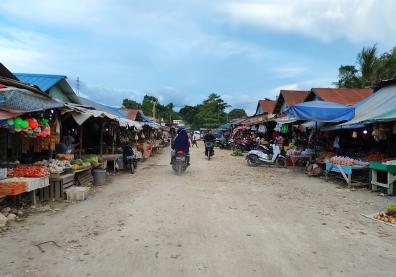Culture and ethnicity as objects of negotiation? The case of Indonesia and South Korea

Cross-research seminar in collaboration with the Migrations en Asie, migrations d'Asie team (IFRAE) and the PopAsiE research group (CERI Sciences Po Paris).
Seminar leader : Hui-yeon Kim
Organizing team : Hélène Le Bail, Yusuke Kunitomo, Oumrati Mohamed, Aki Yoshida, Hui-yeon Kim.
Chair : Hui-yeon Kim (Maitresse de conférences at Inalco, attached to the Institut français de recherche sur
l'Asie de l'Est (IFRAE, UMR 8043) and affiliated to the Institut Convergences Migrations)
Discussant : Asuncion Fresnoza-Flot (FNRS qualified researcher and lecturer at the Laboratoire d'anthropologie des mondes contemporains (LAMC) at the Université libre de Bruxelles)
Jacob Nerenberg (Anthropologist, lecturer in the Anthropology Department at Aix- Marseille Université (as of September 1, 2024) and member of the Institut de recherches asiatiques (UMR-7306 IrAsia)
Title : Merchant migration, autochthony, and interethnic comparison in West Papua
Summary: How does merchant migration transform representations of development and
difference? In West Papua, a disputed territory on Indonesia's Oceanian border, development programs targeting the indigenous Papuan population take place in a context marked by inequalities between natives and newcomers. In the highlands, indigenous empowerment programs aim to increase Papuans' ability to "compete" with traders from Java, Sumatra and Sulawesi. These programs, and the local discourses through which their "failures" are discussed, are rooted in a constant comparison between the economic returns of indigenous Papuans and new arrivals. Essentialist comparisons of "market culture" (notably among the Bugis of Sulawesi) contrasted with a supposedly "non-competitive culture" of indigenous Papuans, obscuring the structural factors that reproduce the ethnic demarcation of the local economy. A socio-economic and historical analysis reveals an intersection of distinct pathways: on the one hand, stagnating job markets in Sulawesi (where economic aspirations are oriented towards trade in Papua) and, on the other, the displacement of Papuan peasant agriculture in favor of dependence on rent disbursements from natural resource extraction. Local debates on development project the comparative indigenous vs. newcomer couplet beyond its ethnic referents, and raise the question of the link between the quest for prosperity and attachment to territory.
LEE Jung-min (PhD student in anthropology at the École des Hautes Études en Sciences Sociales and attached to the IMAF (Institut des mondes africains)
Title: The construction of migrant women's identity through international marriage fights against their stereotypical representation through the media
Summary: International marriages have spawned new social problems, such as marriage fraud, domestic violence and the marginalization of migrant women. These problems have been continually raised in the media, leading to the propagation of prejudices about international marriages. A better understanding of this multiculturalism was called for. In response, solutions were developed and proposed, focusing on these women. The media highlighted migrant women in their productions, so that they could serve as a tool to improve understanding of multiculturalism and its positive functions. However, this figure of women has been stereotyped.
By conducting participant observation, I noticed that certain types of stereotyped representations by the media affect the real lives of migrant women through marriage, thus limiting the representation of their identities and those of their children, focusing on problems rather than their qualities. It would be interesting to analyze how these stereotypes influence migrant women in the construction of their identities in South Korea, which could have an impact on the construction of their children's cultural identity. Here, we can ask the following questions: Why is negative talk associated with migrant women? What expectations does Korean society have of these migrant women? How are they portrayed in the media? Are these images realistic? What influence do these images have on the real lives of these women? What is their identity in the midst of these prejudices? In this presentation, by analyzing images of women portrayed on television and data gathered from interviews with five migrant women who have entered into marriage, we will answer these questions to study migrant women's construction of identity through marriage in their real lives, and their struggle against the stereotypical representation of these women.